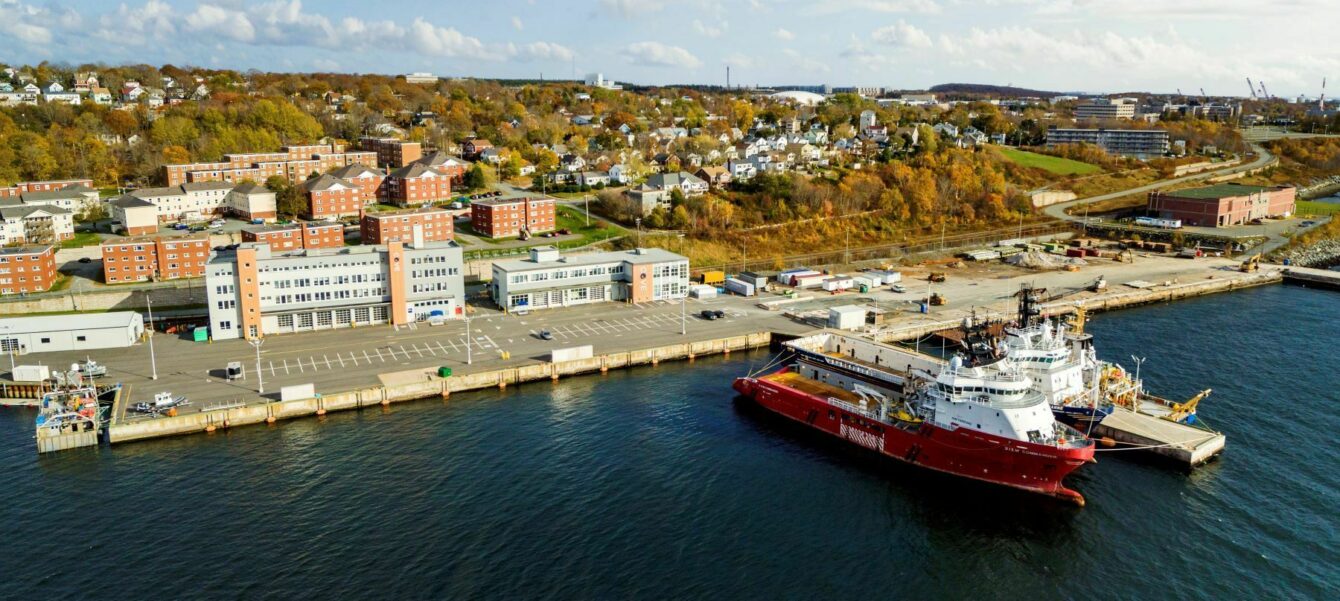
When discussing how the Centre for Ocean Ventures and Entrepreneurship (COVE) had helped the development of his business, Ulaş Güntürkün paused and simply gestured out the window.
The Founder and CEO of bluetech company Marecomms was sitting in the conference room of Start Up Yard, the section of COVE dedicated to young high-growth innovators. And his gesture indicated Halifax Harbour, one of COVE’s greatest resources.
“I can’t stress enough how important it is for us to have easy access to the water,” said Güntürkün, a PhD in electrical engineering. He then listed the ways his company has accessed the harbour, from using nearby vessels, to utilizing the submersible testing platform Stella Maris, to simply walking to the end of a wharf. They’re all options for the entrepreneurs at COVE.
Founded in a former Coast Guard base in 2018, COVE is a hub for ocean-related companies to conduct research and development and create new products. Innovacorp has stationed its Start Up Yard in the facility to nurture startups, but the startups are just a portion of the 60 resident companies at COVE. (The facility also has a list of 60 other companies waiting to get in.)
COVE has two great assets. First is its location on an urban waterfront. Second is the fact that it is led by the private sector and attracts a diversity of companies.
“Part of the magic that’s happening at COVE is the curation of these different types of companies,” said CEO Melanie Nadeau in an interview. “That’s how we’ve seen a lot of our success.”
Shelley Hessian, the head of Start Up Yard, agrees that the mix of companies and the proximity to the ocean are key to the success of her facility and the COVE community
“The big advantages of being here are access to the ocean and access to the oceans community,” said Hessian, who works for Innovacorp. “There’s a lot of cross-collaboration and networking that goes on here. If you go back to any of the Ocean Supercluster press releases, a lot of those companies were networking here.”
Nadeau describes COVE as “unique” – so much so that COVE is being studied by other groups around the world that are trying to establish oceantech hubs. For example, a team from Plymouth, England, has been in touch.
Reproducing what COVE offers isn’t easy because its eight-acre site is such a rare asset. Oceanfront real estate in an urban setting is hard to come by and getting more expensive with each passing year. But what Nadeau points to as the strength of COVE is that it is industry-led and a place for businesses to grow, not just a research centre.
“What’s unique about [COVE] is we’re not government research funded or academic institution funded,” said Nadeau. “There are others [like COVE] but they’re not industry-funded.”
The proximity to the harbour is one of the features that drew Marecomms to Start Up Zone, because the company needs to conduct so many tests in salt water. Güntürkün said the company has benefited from working in the facility for several years, and from tapping other programs in the ecosystem.
The four-year-old company is developing the Robust Acoustic Modem, or ROAM. This modem uses sound waves to transmit and receive images, videos, or other data wirelessly under the water at far greater distances than can be achieved with current methods. In mid-February, it conducted trials in Halifax Harbour – just offshore from COVE – to demonstrate it could send sonar images and photos through a two-kilometre channel in the busy waters of Halifax Harbour.
The company has never raised equity capital, but it has received funding from such groups as the NRC’s Industrial Research Assistance Program, or IRAP, and various programs offered by Innovacorp. It has twice received funding from the Ocean Startup Project.
Another entrepreneur who has been using Start Up Yard is Sue Molloy, the Founder and CEO of Glas Ocean Electric, which is developing technology to electrify boats and also use their batteries as “dynamic energy storage” for power grids. The company, which employs seven people, is now electrifying its second boat and has proposals for 10 others.
Glas Ocean has been operating for several years, and like Marecomms, has not raised equity capital. As well as non-dilutive financing from such organizations as IRAP, Innovacorp and Ocean Startup Project, the company has financed itself by taking on contract work that relates to the electrification of boats.
The company moved into Start Up Yard a year ago and Molloy said the community of entrepreneurs and Shelley Hessian herself make the facility what it is.
“When you’re doing a startup, you’re kind of heads down a lot of the time, and they pull you – sometimes reluctantly – to be part of the community,” said Molloy. “Shelley’s probably the best part of Start Up Yard. With her, you’ve got someone you know always has your back.”